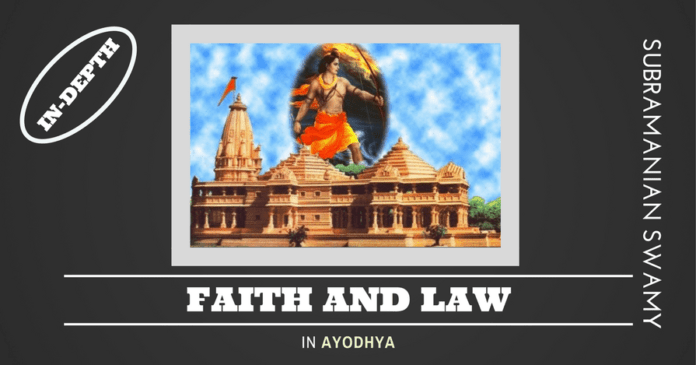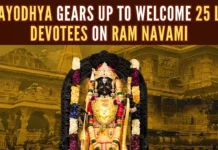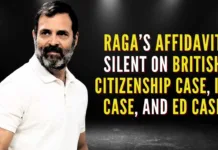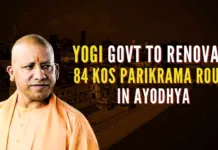
[The author is a former Union Law Minister and also the Convenor of the Legal and Parliamentary Cells of the Hindu Dharma Acharya Sabha].
In my previous post titled Fundamentals of the Sri Rama Temple[1], I had laid out the background of the birth of Rama and why the exact spot where Rama was born has been and remains firmly identified.
It is the Sunni Wakf Board, which entered the legal dispute as late as 1961, that has been litigating in the court claiming the title to the land on which the structure once stood.
This is the very area where stood from 1528 until December 6, 1992, a structure that came to be known as Babri Masjid, put up in 1528 by Babar’s commander Mir Baqi.
In fact, Baqi was a Shia Muslim, and hence he intended it to be a place for Shias to read namaz. Today, interestingly, the Shia clerics have made it clear to Hindu organizations that they would agree to have the site restored as a Ramjanmabhoomi.
It is the Sunni Wakf Board, which entered the legal dispute as late as 1961, that has been litigating in the court claiming the title to the land on which the structure once stood.
This claim has now been rejected by all three judges of the said Ayodhya Dispute Bench. Issue No.20 in Suit No.4 [filed by the Sunni Wakf Board against Gopal Singh Visharad] was framed as follows:
Whether the Waqf in question cannot be a Sunni Waqf as the building was constructed by Mir Baqi who was a Shia Muslim.
Whether the Mutwalli of the mosque not having joined in the suit, the said suit is not maintainable for relief of possession of the disputed structure [a “structure” since it cannot be strictly called a mosque by Sunni edicts– because it did not have the mandatory minarets and wazu (water pool)].
All three Judges thus held that the Sunni Waqf Board has no locus standi and that their Suit for title and possession is not maintainable and thus stood dismissed. The Sunni Muslims are sheer interlopers in this dispute.
That a Ram temple existed and or that there is a sacred spot known as Ramjanmabhoomi is attested by many sources1.
The existence of a temple below where the Babri Masjid stood has been established by GPRS- directed excavations done under the Allahabad High Court monitoring and verification in 2002-03. Inscriptions found during excavations describe it as a temple of Vishnu Hari who had killed the demon king Dasanan [Ravana].
The Sunni Wakf Board does not accept these findings as meaning anything. It does not however matter if all this was indeed so or not, since under Section 295 of the Indian Penal Code[IPC] faith in sacredness of the site is prescribed as follows: “Whoever destroys, damages or defiles any place of worship, or any object held sacred by any class of persons, with the intention of thereby insulting the religion of any class of persons or with the knowledge that any class of persons is likely to consider such destruction, damage or defilement as an insult to their religion, shall be punishable with imprisonment of either description for a term which may extend to two years, or with fine, or with both.” The offence under Section 295 IPC is cognizable and non–bailable, as well as non-compoundable.
That is, an offence under criminal law is committed if a body of persons hold something as sacred. It does not matter if the majority does or does not hold so. Nor can a court decide what is sacred and what is not. It can recognize that which is held sacred and no more. Only a body of persons can identify what is sacred. This was my argument in the Supreme Court while successfully blocking the destruction of the Rama Setu, held sacred by a billion Hindus. The Supreme Court accepted this argument.
This is the position in international law and which was argued skillfully by Senior Counsel G. Rajagopalan on behalf the Hindus before the Lucknow Bench. The Judges took note of his arguments and referred to it in their judgments. In particular, how do we know that Christ was born in a particular spot in Bethlehem in Israel? Because four centuries after Christ resurrection, the mother of King Constantine of the Roman Empire dreamt that Christ was born there. This has been accepted on faith by all Christians today.
Similarly, Al Aqsa and the Dome of the Rock in Israel in held sacred by Muslims because some Imams dreamt that Prophet Mohammed came on a horse there and ascended to heaven. This is now universal Islamic faith today, and thus Muslim demand from the Israelis that Al Aqsa be handed to them on that basis.
Recently, in 2008 the Prime Minister, Dr. Man Mohan Singh asked the UNESCO to grant Heritage status to an island, Manjuli on Brahmaputra River where Lord Krishna was believed to have danced with his gopis. If can Manjuli can be then why not Ram Temple and Setu?
The fundamental question before us is thus this: Can a temple and a masjid be considered on par as far as sacredness is concerned ? Relying on two important court judgments that hold the field today, the answer is no! A masjid is not an essential part of Islam, according to a majority judgment of a Constitution Bench of India’s Supreme Court.
In the famous Ismail Farooqui vs Union of India case[reported in (1994) 6 SCC 376], the Supreme Court had observed: “It has been contended that a mosque enjoys a particular position in Muslim law and once a mosque is established and prayers are offered in such a mosque, the same remains for all time to come a property of Allah… and any person professing Islamic faith can offer prayer in such a mosque, and even if the structure is demolished, the place remains the same where namaz can be offered .”[para 80].
The Constitution Bench rebutted this contention. The Bench stated: “The correct position may be summarized thus. Under Mohammed law applicable in India, title to a mosque can be lost by adverse possession… A mosque is not an essential part of the practice of the religion of Islam and namaz (prayer) can be offered anywhere, even in the open. Accordingly, its acquisition is not prohibited by the provisions in the Constitution of India.” [para 82].
Thus what was wrong in the demolition of the Babri Masjid on December 6, 1992 was that it was unauthorized by law and hence a criminal offence. Otherwise any Government depriving the Muslims of the Babri Masjid is within law, if the government decides to do so in the interest of public order, public health and morality [Article 25 of the Constitution]. This is the position in Islamic law as well since in Saudi Arabia the authorities demolish mosque to lay roads. Even the mosque where Islam’s Prophet Mohammed used to pray was demolished for a road to pass through!
But then what of a temple? Is it in the same category as the mosque in our jurisprudence? When I was Union Law and Justice Minister, this question of the status of a temple – even if in ruins or without worship – had come up before me in November 1990 in a case of a smuggled out bronze Nataraja statue which was up for sale in London1.
After a series of appeals the UK Apex Court upheld the Indian government’s position that because of the prana prathista puja a temple is owned by the deity, in this case Lord Shiva, and any Hindu can litigate on behalf of the deity as a defacto trustee. The Bench consisting of Justices Purchas, Nourse and Leggatt concluded: “We therefore hold that the temple is acceptable as party to these proceedings and that it is as such entitled to sue for the recovery of the Nataraja.” [page 648 para g].
Thus even if a temple is in ruins as the Archeological Society of India (ASI) had found, or destroyed as Ram Temple was, any Hindu can sue on behalf of Lord Rama in court for recovery! No such ruling exists for a mosque for the simple reason that a mosque is just a facilitation centre for reading namaz, and has no essentiality for Islam religion. It can be demolished and/ or shifted as any building can and are being so in Arab countries and Pakistan. That is, the Ram Temple on Ramjanmabhoomi has a superior claim to the site than any mosque. This the fundamental truth in the Ayodhya dispute. This truth will apply to Kashi Vishvanath and Brindavan temple sites as well.
The only compromise we Hindus can accept is that Muslims agree to shift the building of a new masjid to some other site beyond the Saryu River. It is important to note that as of now there are eight mosques in Ayodhya which the ASI has taken over since these had no one coming to read namaz. Hence what use will another mosque be? If however the Muslim hardline organizations want to re-build the Babri Masjid in the Ramjanmabhoomi area, then the Hindus will launch a struggle.
Hence what should be the patriots’ response to the judgment of Lucknow Bench of the Allahabad High Court allotting one-third of the Ramjanmabhoomi to the Sunni Wakf Board to build a mosque in the area near the Ramlala temple? The response should be a resounding No! A temple cannot be equated to a mosque. Nor can we Hindus by the back door allow aggression and atrocity of demolishing temples be rewarded in any manner. Therefore, as with the Shah Bano case precedent, Government should be forced by agitation if necessary to bring an amendment to the Acquisition of Certain Areas of Ayodhya Act of 1993 to bar constructing any structure other than those connected with a temple for Sri Rama.
That will be the fit atonement of the entire people of our nation for tacitly tolerating for so long the demolition of Ram Temple on the orders of Babar of Afghanistan. Babri, after whom the mosque is named incidentally was a 9 year boy in Kabul who was a “special” intimate of Babar.
If such an amendment is not brought forth, Hindus should wage a fierce democratic struggle for the next 3 ½ years to force the government to do so or weld a solid Hindu vote so that in the next General Election a Hindu Front supported by the Hindu Dharmacharyas, VHP and RSS can obtain an absolute majority in the Lok Sabha.
References:
[1] Fundamentals of the Ram Temple – Dec 6, 2017, PGurus.com
- Dr Swamy explains in-depth how Faith and Law is basis in Ayodhya judgment - December 17, 2017
- Subramanian Swamy’s article – Fundamentals of the Sri Rama Temple - December 6, 2017











[…] An in-depth article by Dr. Swamy on how temple and Masjid are different and why it is important for … […]
[…] An in-depth article by Dr. Swamy on how temple and Masjid are different and why it is important for … […]
[…] An in-depth article by Dr. Swamy on how temple and Masjid are different and why it is important for … […]
Hindus must unite not only for Ram Mandhir but generally against any form of attack on Hinduism, its culture and temples and practices. Our chalta hai attitude will be the death knell of Hinduism
Hindus should launch a peaceful, democratic agitation to encourage the Govt of India to build Ram Temple in Ayodhya. When Rajiv Gandhi Govt went against SC judgement in Shah Bano case to appease Muslims votebank, why cant Modi Govt be pressurised to act in favour of Hindus?
DIVIDED HINDUS (by congressi crooks) NEED UNDERSTAND THAT THEY ARE VULNERABLE UNDER “SECULAR” LAW WITH MUSLIMS GROWING FAST IN NUMBERS BY UNCONTROLLED PRODUCTION OF CHILDREN AND SO BE UNITED ONCE TO PUT THE VOTED BJP GOVT TO 3/4 MAJORITY AND THEN THE PROBLEM WILL VANISH!
As usual an enlightening article, in this website.
However, am sorry to note that the facility to copy and keep a record has been disabled, by you, now. Earlier, ur article could be copied and then translated in leisure and ur ideas could be propagataed, in other languages. by ur FANS.
I used to share ur views in Tamil, in my circle.
But, it now seems, U are more interested in COPYRIGHT than propogation of ur ideas. Honestly, I do not see what U GAIN by restricting access.
Ur PRIDE more important than the reach Ur ideas could have, in local languages.? Any way all the Best .
Will always remain an admirer of Ur articles but will regret inability to take U to others whom U cannot reach.
Noted your reply. We had no choice – our own post was being copied by other sites without giving the slightest attribution. It is not aimed at readers. Regrettably, we cannot distinguish one from the other.
Take easy attitude against hard attitudes of other groups is causing innumerable loss to Hinduism and Hindus. Other groups are United in their endeavour to destroy Indian culture along with Hinduism. There should be strict laws against the conversion of Hindus into other religions. Poor among Hindus should be treated as special and should be provided all support as they are the target for other groups to convert .
This is a clarion call given by Dr.Swamy for Hindus to unite for s cause. I welcome this.
N.Gaonesh
Hope all Hindus think and act like dr Swami . Unite or perish o Hindu Time to wake up and only vote for BJP to make Hindu survive. Hindus in Pakistan Bangladesh Kashmir are now a history save India or you will be history.